Text

lillies & forget-me-nots
1K notes
·
View notes
Text
all things considered i don’t actually think tamsyn is setting up augustine or silas to act as virgil to harrow’s dante in hell unless alecto the ninth plays with time dilation, which would be really interesting! but as it stands neither of these characters have been in hell particularly long. ulysses on the other hand has presumably been in hell for thousands of years and he’s still a bit of an unanswered question given the revelations about him in nona the ninth. like… whose soul does he have? john acquired him as a corpse!! john named him after a dog!!! john’s dead kid that founded the dead kid house… ulysses the first i would love to know you……
335 notes
·
View notes
Text
Saving some Reddit comments about BOE to prevent linkrot

Feel free to ignore this if you’re just browsing through your tags.
Keep reading
26 notes
·
View notes
Text
BOE, the Messenger(s), and the Trillionaires

Introduction
I’ve been doing a re-read of the Locked Tomb - although technically it’s a re-listen, because I like the audiobooks - and I stumbled across a particular passage that hadn’t stuck in my memory before that made me rethink my understanding of the origin of Blood of Eden. Ever since Harrow the Ninth and especially since Nona the Ninth, there’s been this common interpretation that the BOE are descendants of the trillionaires who abandoned Earth and that’s why John is at war with them. I’m not so sure that’s true any more.
Here’s why. In Nona, when the whole business with Crown/Corona infiltrating the barracks kicks off, there’s an interesting exchange between Camilla and We Suffer about the Oversight Committee that includes this statement:
“Hect, what you must understand about Blood of Eden is that we own things in common, we share responsibilities and resources in common. She could have moved these resources at will…but I must make one move at a time. And above all, I must place the safety of…Blood of Eden’s continuity…even above the mission.” (Emphasis mine.)
This took me aback somewhat, because the emphasis on militant communal ownership doesn’t really fit with the idea of “descendants of trillionaires.” I suppose one could say that it’s been ten thousand years, cultures change and drift over time…except that, as I’ll get into later, the BOE seems very very insistent on cultural preservation, so it would be a bit out-of-character if they changed that stance on this one particular issue.
And that’s what made me think: what if the BOE aren’t the descendants of the trillionaires? What if they’re the descendants of the non-trillionaires on the FTL ships?
Keep reading
454 notes
·
View notes
Text
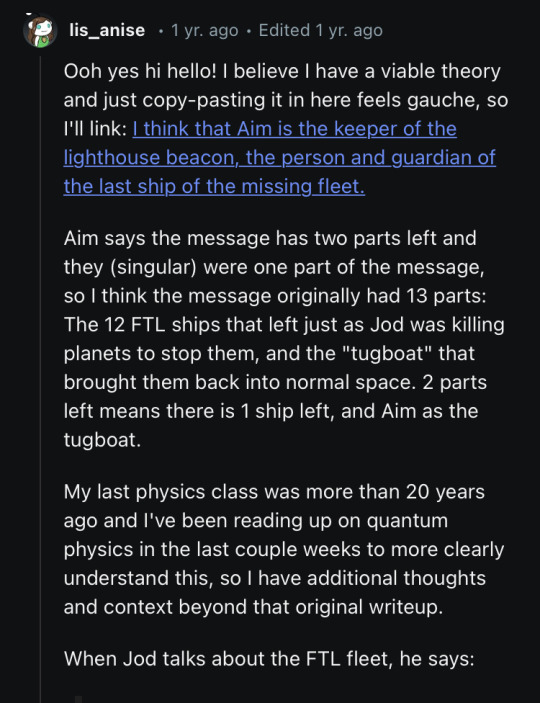
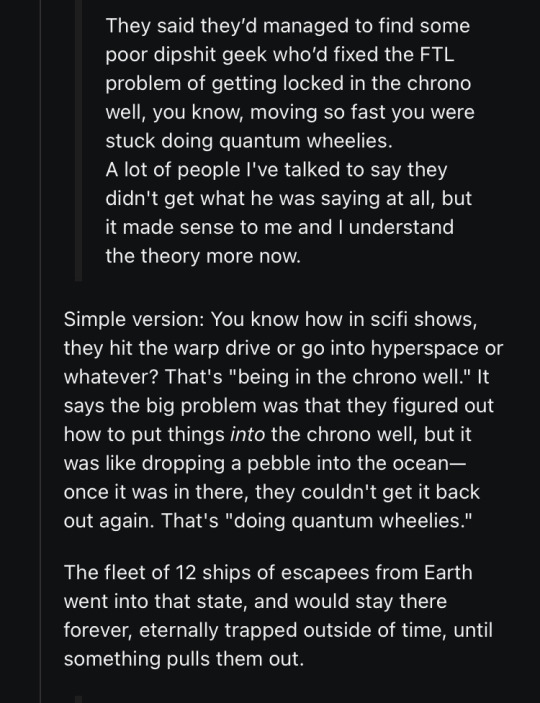

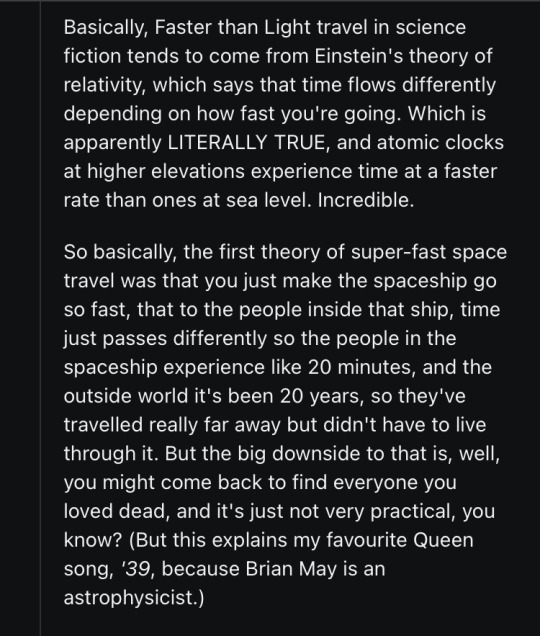


the angel and the message
10 notes
·
View notes
Text
It's been said before but I'll say it again — ever be so deeply, permanently emotionally destroyed by killing your best friend in the name of the newfound necromancer/cavalier relationship that you build a house that treats cavaliers as innately disposable, breeds them for a single purpose, genetically matches them to babies before they are born, names them for sacrificial animals, specifically so none of the necromancers who follow behind you will experience the heartbreak of losing the person they love most in the world, so horribly that they can't stand to hear their name spoken aloud for the next ten thousand years, only for the scion of that house, ten thousand years later, to be so revolted by the concept of killing his cavalier for Lyctorhood, so disgusted by your crime, that he claims G-d's directly expressed will is heretical and fundamentally morally opposed to the principles of the religion you helped to found?
And then, when that person does do what you explicitly built his house to be able to do and uses his cavalier as a tool rather than a person — even if he does it because he believes his cavalier capable of surviving anything, the polar opposite of what you tried to teach his house to believe — he experiences his cavalier's death as such an abrupt and horrifying loss that after he himself is killed he wanders the afterlife in grief, impotently taking revenge on a woman who should have been burned up for Lyctorhood by the person who loved and needed her most, but was spared, saying may all the blood of your blood suffer even a fraction of what I have suffered? The suffering you tried so incredibly hard to insulate him from? He of the church you built to bury the memory of a nun?
1K notes
·
View notes
Text
On my first read of HtN I interpreted the Canaan House chapters as Harrow's altered memories, as in they were events that had already happened that the narrative was recalling from Harrow's altered perspective. But that's not actually what's happening. These aren't memories, they are events actually being experienced in real-time by the souls of those who died at Canaan House and Harrow in the River. On my second read now I'm thinking more about what this means for Harrow, who is also in the living world. How exactly is she experiencing these events? This line specifically:

got me thinking that she must somehow be experiencing these two realities simultaneously. Knowing what we do now about soul permeability from The Unwanted Guest, this sounds like maybe Harrow is getting some soul-transfer knowledge from Abigail while their souls are together in the River.
Anyway, I'll be keeping this in mind while reading now. I wonder if there's anything else this I missed the first time.
16 notes
·
View notes
Text
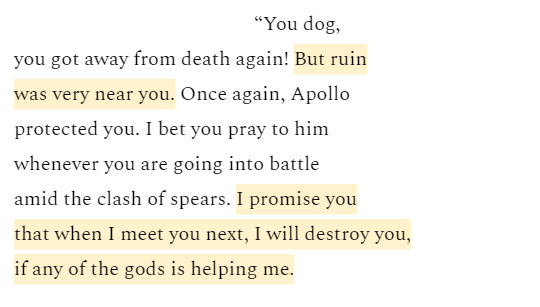

The Iliad, Homer, trans. Emily Wilson / Nona the Ninth, Tamsyn Muir
88 notes
·
View notes
Text
I think often about the heavy irony of John laughing at Wake's name and mocking BOE's naming systems. BOE are trying to preserve lost Earth culture, but clueless of context, their fragmented merging of high and low culture comes across as silly to John (and us. But it's a noble attempt to preserve everything, even the stuff that wouldn't necessarily seem 'worth' saving. But what does John rename his friends? Pyrrha and Cassiopeia and Ulysses and Augustine. He also names almost everything after Earth culture, but it's literary/religious/historical 'high' culture. BOE is scrabbling to save everything possible, but John has the privilege of context and memory, and so he picks and chooses what's 'worthy' of being used or shared. Low culture is reserved for his little jokes with himself— though honestly, a lot of his references to earth culture full stop seem to be inside jokes at the expense of others. I doubt Cassiopeia knew she was named after the infamously vain ancient queen, for example. John also quotes things at people without explaining what he means, like when he quotes Shakespeare and Hans Christian Andersen at Harrow; he's not really sharing it, he's mostly using it to isolate the other person in the conversation, or make himself seem unknowable and superior. It's honestly very telling that when given the choice John will name most things biblically or classically. It does partially feel like he's desperately scraping to preserve something of his childhood and the home he destroyed (especially with the renaming of Gideon to the Māori translation Kiriona, but... well, he literally renamed her and made her into a walking corpse teenage soldier so :/), but when you look at how he deploys earth culture on the whole, it usually becomes weird and imperialistic and weaponised. He's not really preserving lost art, he's selectively using it for his own agenda, and he's often using the two biggest things that were ever co-opted by conservatives and imperialists, the classical world and biblical convention.
3K notes
·
View notes
Text
I have always been fascinated by the scene in Harrow the Ninth where all of God’s lies are finally revealed, so here is a post of appreciation for the last part of the book and also trying to pick apart some of what Muir is doing on a writing level, because I want to steal all of it for my own to gain even a tenth of her power lol
- “What? No tongue in your head, you—you mutant, you mistake, you great big calf-eyed fuck-up?!”
mercymorn is the funniest person to ever live probably dfhasjkfas (moira quirk’s delivery of this in the audiobook is out of this world, please experience it for yourself one day.) the metatextual layer that she’s essentially saying this to locked tomb jesus, and that she would 100% still be saying it if she knew just how much she’s talking to locked tomb jesus, because that is the very essence of who mercy is as a person… fucking immaculate
- God said, “Summarize, please. You both do tend to go overboard on the foreplay.”
no actually John Gaius is the funniest person who’s ever lived (and died and lived again etc.). in the middle of his ancient lies finally being exposed and all his death empire and personal life about to come crashing down around him as he gets exploded, he still takes a moment to be completely, comprehensively, needlessly, astoundingly and utterly petty. inspirational, in a way. if you commit the profane act of resurrection you, too, could spend ten thousand years working on becoming your very worst self
(also a definite indication that God is terrible in the sack, what the fuck)
also, Mercy throws John’s own ‘You’re trying to start a fight with me to get out of the fight I’m trying to have with you, which is a painfully domestic tactic’ from the beginning of the book back in his face here at the end, which shows that even so, John is merely a novitiate in pettiness, she will brook no comparison <3 I love her so much
- Upon seeing God getting exploded, Pyrrha straight up stands there with her cigarette until it burns down to ashes in her hand fhsdkjfhas. god this poor woman she’s been dying for a cigarette all that time and she’s too shocked by everything going on to even get to smoke it!!!
can you imagine what a mindfuck all of this is for her, though. she’s been doing the same thing as Gideon has this whole book from the back of her necromancer’s head for ten thousand years, she lost her necromancer like half an hour ago, max, and is figuring out being in the driver’s seat of his body (his corpse??? technically???) alone for the first time, she just mercy killed her ex, she found out that at least she and her necromancer didn’t kill both their lover and their child twenty years ago (and also it wasn’t their baby, it was baby jesus in a space pod, phew, that makes it… better? no, no not really huh), she finally got a cigarette… and then her siblings in death empire seemingly upend the entire natural order she’s known as long as she’s had consciousness.
“It was complicated.” she’s saying what we’re all thinking. if she simply wants to settle down on a farm somewhere and live a quiet life, no fucking wonder!
A lot more thoughts behind the cut Because Of Who I Am As A Person
Afficher davantage
838 notes
·
View notes
Text





on planet killing : why lyctors kill planets
16 notes
·
View notes
Text
Do you think Jod's just got the gift for keeping it locked in or does lyctorising a planet just change how you perceive time? Because I know for a fact I would've had a breakdown before we hit 1000 years of immortally insisting I didn't do nothin' (kinda accidentally and kinda on purpose kill everybody during a panic attack and end the world).
536 notes
·
View notes
Note
Love your TLT meta! I'm curious - what do you make of Nona's "You looked like you wanted to be kissed, that's all." and Alecto's " This is how meat loves meat."?
Thank you!
I don't really have a coherent answer, and I suspect we won't really get one until ATN. We know that Alecto is...a Resurrection Beast...a fully Lyctorised cavalier...that is, some combination of the collective soul of planet earth and the soul of a human guy called John (plus or minus 10 billion ghosts). But just what is Nona?
You kept screaming and screaming...like a baby in pain. So I tried to hurt you - I did hurt you. I reached out for you and it hurt you... He said, I put my hands around your neck. He said, I cupped your soul in my hands. He said, I took you into myself and we became one. ...He said, As the world went up I remade us both. I hid me in you... I hid you in me. And when we were together...once the shaman had claimed the sun... I became God. (John 1:20)
This excerpt elides some of the full horror of John's description, in which Alecto screams rather a lot more and John is vomiting dirt and tearing his ribs out and blaming it all on human nature and his id while he binds her into some horrifying nightmare Barbie body and worries that she'll "escape" before he finishes.
We know Nona doesn't enjoy having a body. And we know necromancy makes Nona feel sad.
There's one particularly horrifying moment in NTN where these two things come together:
She wanted to shout. She wanted to be listened to. She wished the barrier had taken her hands. She wished she had thrust herself into it - become that big seething mass of flesh and meat and tendrils - ruined her body, just melted it; come back messed up, so that nobody could want her body but her, so that it would be hers and nobody else's. (NTN ch 24)
The language that Tamsyn Muir uses to describe both what John did to Alecto and the way that Nona's borrowed body subconsciously remembers that violence is so viscerally uncomfortable.
Just a few chapters later, Nona begins to remember who she is:
"Did you think this was fun, Pyrrah Dve? Did you think this was lovely? Family. Blood. Together. Kiss, kiss. A child's game. You say nice words and everyone pretends they are the words you say. Here is a house. We live in it. Worms slithering over each other... Did you like playing pretend? Did you like being mother and father? You should have given into your desires and eaten us. Chew and swallow. More natural. Would have respected you for it..." (NTN ch 28)
Who have we met who likes to play a twisted game of happy families but who at the end of the day will justify his desire to own and consume and destroy as natural and understandable?
What "lessons of the hand and the mouth" did Alecto learn when John "saw the face of Earth and choked the life out of it and ate it whole"? (John 5:4).
I'm never not haunted by the line in HTN where John reaches out for Harrow and she physically cannot refuse him: "the meat of your meat and the flesh of your flesh belonged to God." (ch 9), which so closely echoes Alecto's "this is how meat loves meat".
"I might not help you when... I'm back," she said, not quite understanding I. "I'll be different. I'll remember everything... I'll remember the thing I'm trying to forget... I won't love anything... I won't know how. I won't be me at all, or I'll be the me who knows the thing, and knowing the thing means I'm not Nona - I'm someone else." (ch 31)
Nona is, in some way we don't quite understand yet, Alecto without John.
And that fills me with quite a lot of sorrow for Alecto and trepidation for Alecto the Ninth.
111 notes
·
View notes
Text
really interesting to me how htn interacts with fratricide foundation mythology on a subtextual level. we’re led to believe, early in htn, that augustine (as harrow explicitly writes in her notes) “killed [his] own brother” in a sort of cain or romulus style that laid the groundwork that lyctorhood stands on, being that he was the first to ascend. but as it progresses, we learn a little bit more about alfred through the words of the lyctors and john: he was “led astray”, cristabel was a “bad influence”, and augustine seems to outright blame cristabel (and mercy, by extension) for the circumstances surrounding alfred’s death in the first place. he did not want lyctorhood at the expense of his cavalier (and no one did!). as augustine refuses mercy’s suicide pact at the end of the novel, even telling her that she picked the wrong man to enter into one with, it’s evident lyctorhood in fact was not founded on fratricide, at least not in the traditional sense, but it is on suicide. just like harrow’s circumstance, just like mercy’s — and the fact that he didn’t actually kill his own flesh and blood in a display of might is all the more horrifying
209 notes
·
View notes
Text


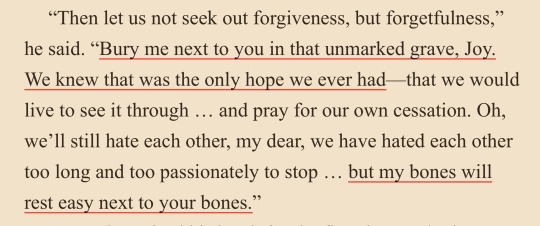
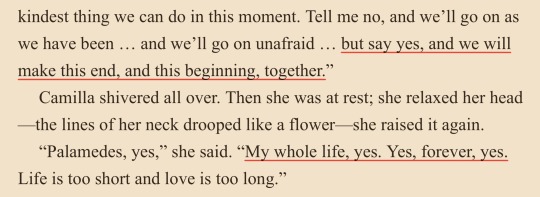


the mysterious study of doctor sex / gtn 37 / htn 52 / ntn 28 / john 1:20 / ntn 32
we're together. we'll go together.
844 notes
·
View notes
Text

I found this rainbow brush that changes color and I decided to draw Ianthe and Corona
561 notes
·
View notes
